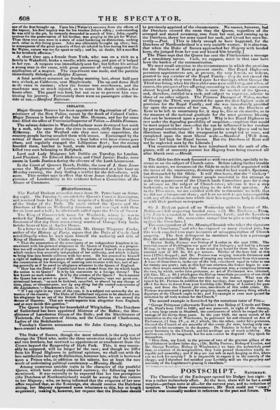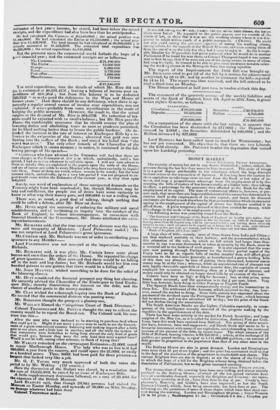POSTSCRIPT
• SATURDAY. The Chancellor of the Exchequer opened his Budget lust night: it was a rather melancholy affsir. At the best, there will be but a small surplus—perhaps name at all—for the current year, and nu reduction of taxation. Under these circumstances, Mr Rice could not "crow r and be was unusually modest in reference to the past sad future. The
estimates of last year's income, he stated, had been below the actual receipts, and the expenditure bad also been less than he anticipated—. He had calculated the Customs at 20,540,000/. ; the actual produce was 2L4.4.5,000/. He had calculated the Excise at 14,150,0001. ; the actual pro- duce was 14,439,0001. The total income he had calculated at 46,980,000/. ; it actually amounted to 48,453,000/. The estimated total expenditure was 44244000/.; the actual expenditure 45,141,0001.
But the pressure upon the commercial world forbade the hope of a gore) financial year ; and the estimated receipts are as follows—.
The Customs £21,100,000
The Excise 13,800 000 Stamps 6,800,000 Taxes 3,770,000 Poet. office 1,600,000 Miscellaneous 170,000 £47,240,000
Tile total expenditure into the details of which Mr. Rice did not go, is estimated at 46,631,415/. ;_ leaving a balance of income over ex- penditure of 608,5851. ; but from this balance is to be deducted 223,912/. "to make good the deficiencies in the Ways and Means of Former years." How there should be any deficiency, when there is ap- parently a regular annual excess of income over expenditure, was not explained : it arises probably from some mystification in the mode of keeping the public accounts. However, the result is, that the actual surplus at the disposal of Mr. Rice is 384,6731. No reduction uf tax. ation could be expected with so small a balance ; but Mr. Rice gave the Rouse the comfortable assurance that he should resume the plan of lowering duties and abolishing taxes as soon as prudence permitted, for he liked nothing better than to lessen the public burdens. He de- fended the increase in the rate of interest on Exchequer Bills by a re- ference to the exigencies of the times ; observed that gold was now flowing into the coffers of the Bank ; and stated his belief that "the worst was over:' The only other remark of the Chancellor of the Exchequer which it seems necessary to notice, is contained in the fol- lowing passage of his speech- " Gentlemen who have adverted to the Estimates will find that there are some charges iu the Estimates of this year which, undoubtedly, until a late period, Iliad no reason whatever to calculate upon. I will not now advert to them in detail; they are explained in the papers upon the table of the House, and are of course accessible to every Member who may hove curiosity to inquire into them. Some of them are voted, others remain to be voted ; but the total amount which, undoubtedly, up to a very late period I was not prepared to ex- pect would come within the Estimates of the current year, is very close upon 300,000/.
Surely, one word of explanation of these unexpected demands on the Treasury might have been vouchsafed ; for, though Members may be lazy and indifferent, the people out of doors have some curiosity to know in what way their money goes, and 300,0001. is not a trifling sum.
There was, as usual, a good deal of talking, though nothing that could be called a debate, after Mr. Rice sat down.
Mr. Hume urged the necessity of reducing the military and naval eetablishtnents, and of instituting an inquiry into the conduct of the Bank of England, to whose mismanagement, in connexion with financial blunders of the Governmerit, Mr. Hume attributed the exist- ing embarrassments.
Mr. fireitanns said, that the true cause of the distress was the igno. mnce and incapacity of Ministers. (Lord Palmerston smiled.) Ile was not surprised at Lord Palmerston's gross ignorance.
Mr. CURTEIS said, Mr. Richards was out of order in attributing gross ignorance to any Member— Lord PALMERSTON was not annoyed at the imputation, from Mr. Richards.
Mr. RICHARDS said, it was plain Mr. Curteis knew more about beeves and oxen than the orders of the House. He repeated his charge of gross ignorance. Mr. Rice assumed that there would be no falling off in the malt and hop duties ; but Mr. Richards would bet him two hundred guineas to one guinea that there would be a falling off.
Mr. JOHN MAXWELL wished something to be done for the relief of the labouring classes.
Mr. HUTT considered the financial prospect any thing but cheering. He earnestly advised the Chancellor a the Exchequer to fund Exche- quer Bills ; thereby diminishing the interest on the debt, and the chance of another panic in the money-market.
Mr. CLAY wished for a thorough inquiry into the Bank of England. Re trusted that the commercial distress was passing away.
Mr. ROBINSON thought the prospect a gloomy one, Mr. WALLACE blamed the "iniquitous Court of Bank Directors."
Colonel THOMPSON and Mr. POTTI:R thought the way to relieve the country would be to repeal the Bread-tax. The Colonel said, his nos- trum was this Allow the men who were declared to be starving to purchase food where they could get it. Might it not move a grave man to smile to see the Govern. meat of a great commercial country balancing and making inquest after a little gain in one place, and a little Imes in another, and all the while the traders of that community were forbidden to bring from abroad the only kind of goods that would pay, because they were the only kind that were wanted here? Would it not be well, among other schemes, to think of trying this? Mr. WAKLEY remarked on the extravagant Estimates-21.000l. voted to repair Marlborough House. The lady who was to live in it bad 100,00U/. a year from the country, and could spare the 21,000/. as easily as a hundred pence. Then, 90001. had been paid for three pictures—a bargain that looked very like a job.
Mr. G. F. YOUNG very much approved of both the votes ob- jected to by Mr. Wakley. (Of course.)
Here the discussion of the Budget was closed, by a resolution that the sum of 13,622,300/. be raised by an issue of Exchequer Bills. A little supplementary discussion followed, on a vote of 29,4001 fur the expenses of the British Museum.
Lord STANLEY said, that though 23,985 persons bad visited the Museum on Easter Monday, and upwards of 30,000 on Whit Monday, no damage whatever bad been done Colonel THOMPSON said—. It was not am rog tie w row; csisses. but tan an.to retie classes, the 'MO 'a- dmits Weis foul. Ile appealed to the puha,. papers, arid the records of the courts of 'aw, to show that it was not the working classes whom it was dan- gerous to admit within reach of a public monument. ( Cheers). He could not also 1,void noting the grkv.us injustice of taxing the working classes, among others, for the support of the Blitish Museum, and then cutting them off from the use of it on the only day they had I, isure to enjoy it. As the honour- able Member for Wigtonshire had given notice of what he would do in another Parliament if he fouod his way there, so Colonel Thompson hoped it was compe- tent to him to say, that if he were not one of the dying swans, so many of whom had sung tc-night, he trusted to be able to give some assistance towards reliev- ing the working classes in the Metropolis from this crying injustice.
The report of the Imprisonment for Debt Bill was brought up. Mr. Ricit mins tried to get rid of the bill by a motion for adjournment —rejected, by 58 to 20; and by another to recommit the bill—rejected by 54 to 14. The report was then received, and the bill ordered to be read a third time on Monday.
The House adjourned at half past two, to twelve o'clock this day.



























 Previous page
Previous page